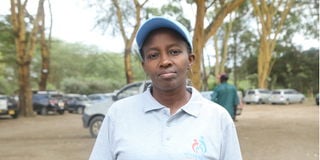One woman's journey to help uncircumsiced men overcome stigma in Naivasha

Susan Wangari poses for a photo after an interview with Mtaa Wangu in Naivasha on February 17, 2025.
When Peter* reached the age for his rite of passage, he was eager to join his peers. However, his parents were unable to facilitate it, leaving him isolated.
This exclusion led to deep stigmatization—he couldn’t bond with his circumcised peers, nor could he play with younger boys since he was older.
"Because I didn’t undergo the rite with my peers, they avoided me like the plague. I felt ashamed and stayed home, losing many friends," Peter recalls.
Overwhelmed by humiliation, he ran away from home, seeking anonymity in unfamiliar places. The constant fear of being discovered forced him to keep moving, preventing him from continuing his education.
"I wandered for four years. Each time someone found out I wasn’t circumcised, I relocated to another town. I moved from Narok to Maaimahiu and finally Mirera, Naivasha," he says.
His situation remained the same until last year when he finally underwent the rite of passage. This gave him a renewed sense of confidence and allowed him to reconnect with his peers.
Peter also enrolled in a polytechnic, where he acquired mechanical skills. Through the support of Susan Wangari, he also secured employment in Naivasha, enabling him to earn a living.
Wangari has helped four other young men like Peter through her boy-child empowerment program, aiming to restore their confidence and sense of belonging.
"Through my initiatives, I encountered young men who felt isolated due to being uncircumcised. I therefore made it my mission to help them reclaim their self-esteem," she says.
Wangari emphasizes that her support extends beyond the rite of passage, ensuring the young men continue to rebuild their confidence and avoid being bullied.
"I make sure they stay at a health facility until they fully heal, and afterward, I connect them with supportive peers to prevent bullying, as the stigma doesn’t disappear overnight," she explains.
Her passion for empowerment began after her daughter dropped out of school and fell into bad company.
She recalls how her daughter got involved with a young man who was vending water at a young age.
"If I had questioned why he was working instead of attending school, I might have prevented my daughter from taking the wrong path," she reflects.
Determined to make a difference, Wangari now provides a platform for boys to openly express themselves. She also helps school dropouts gain vocational skills by enrolling them in polytechnics.
"I engage with young men in schools and the community, offering them a space to speak, be heard, and feel empowered. I encourage them to express themselves openly, despite societal pressure to always appear strong," she says.
Her ultimate goal is to establish an educational facility for boys who have left school, offering both skill development and psychosocial support to help them reintegrate into society.
